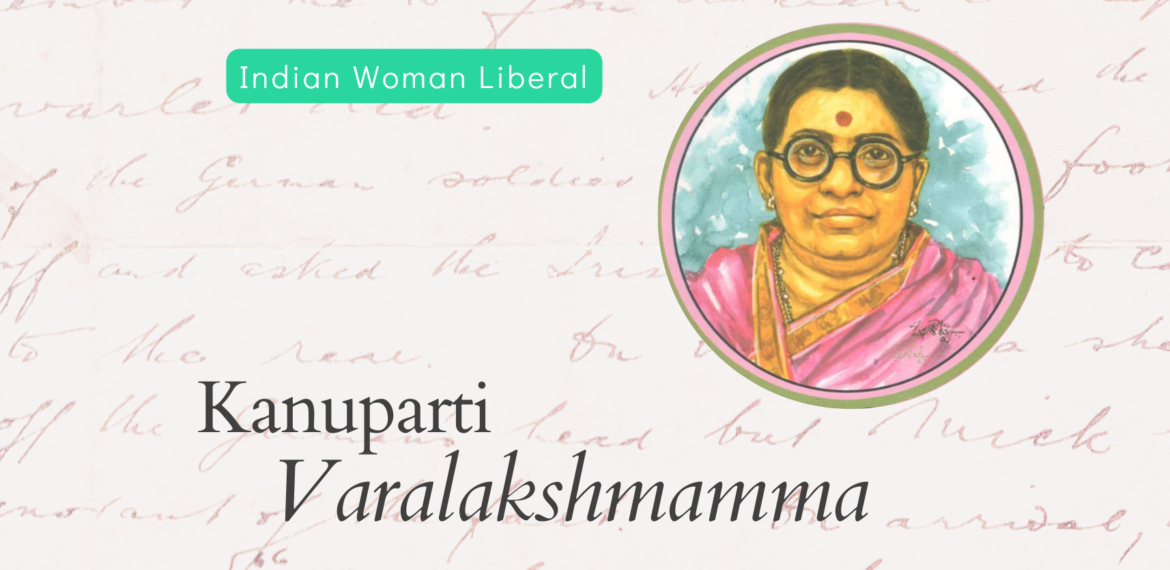The following article revisits Kanuparti Varalkashmamma’s literary contributions to social change and improving women’s lives.
Kanuparti Varalakshmamma was a prominent Telugu writer and social worker who contributed to the women’s movement during the Indian freedom struggle. Born in 1896 in Bapatla, Andhra Pradesh, she was encouraged by her father and brothers to read and write. She married early and was supported by her husband in pursuing her social and literary activities. She used to read and write letters for illiterate women around her and thus developed an interest in writing stories herself. She began her writing journey with a Telugu translation of an English story. It was published under her pseudonym ‘Saudamini’ in the monthly journal, ‘Anasuya’.
She later wrote many stories like Kuteeralakshmi, Penshanu Puchukunna Naati Ratri, and novels like Vasumati and Viswamitra. She wrote columns named Maa Chettuneeda Muchatlu in Andhrapatrika and Sarada Lekhalu in Gruhalakshmi. She established Stri Hitaishini Mandali in Bapatla, an organisation for women’s welfare. She wrote and spoke vociferously on contemporary issues like Child marriage, Sarada Act, non-cooperation, Divorce Act, and so on.
Kanuparti Varalakshmamma was a pioneer of a literary process called Lekha Sahityam. These writings are in the form of letters written by the author or another fictional character and are in a casual tone similar to day-to-day conversations. Sarada Lekhalu is one such literary marvel created by Varalakshmamma. It is a compilation of letters published as a column over six years that she wrote to her imaginary friend Kalpalata under the pseudonym Sarada. Through these letters, she promoted awareness, evoked debates about many social evils and problems faced by women, and tried to educate women about their rights.
One of the letters narrates a conversation among women on a train about child marriage while Sarada was returning home from a trip.
An old woman says, ‘I heard they are bringing a law restricting a girl’s minimum age of marriage to fourteen years. Isn’t it against our customs and traditions?’ Then a young widow says, ‘Let it be! I was married off when I was five, and my husband died three months later. At least the women in the future would be saved from such episodes.’ Then the old woman replies, ‘Widowhood is a matter of fate. Can you avoid it even if you are married after fourteen years?’ The young widow responds, ‘At least women don’t have to experience it before fourteen. They would know what marriage is and who the husband is. Now I can’t even remember the face of my husband. Is it fair?’ The old woman had no answer.
Another woman says, ‘This law has to be passed. Only then would the parents stop selling and trading their daughters in exchange for something. Girls are merely a tradable currency or a useless coin in the hands of their parents. My mother died when I was five, and my father was fifty. Society and his relatives advised him to remarry. Do you see the irony? If an old man becomes a widower, he is allowed to satisfy his desires by marrying someone again. But if a young girl becomes a widow, she has to give up all her desires and live the rest of her life alone. A young widow is expected to embrace Vairagya(renunciation), and an old widower is expected to embrace a new wife. How is this fair?’
She continued, ‘His new bride’s parents wanted my hand in exchange for their son, and my father agreed. My husband was sixteen and addicted to all kinds of vices. Parents don’t care whom their daughter is getting married to as long as their son is getting married. They care only about their son’s welfare and happiness and are willing to sacrifice their daughter’s life. Isn’t she also their offspring? My husband became a criminal and went missing. My father died, and my stepmother asked me to leave the house. Now I have nowhere to go!’
‘My father sacrificed my life for his happiness. My in-laws sacrificed their daughter’s life for their son’s happiness. If women like me had agency over themselves, would they let these kinds of incidents happen? Considering the stories of such women, I support Har Bilas Sarda’s Child Marriage Restraint Act. I request all kind men and women to support this Act too. If women oppose this Act, they are digging their own graves. Our ancient scriptures don’t support child marriages as well. Child marriages continue to happen only because of our.…’ The train came to a halt ending the conversation abruptly, and Sarada had to get down at her station.
In another letter, she described the abrupt rise in the number of child marriages just before this Act was implemented. In a letter published two years later, she discussed how the proposed amendments to the Sarada Act allowed parents to apply for an exemption to get their daughter married before the age of fourteen and how they made the Act useless. She used a simple conversational writing style in Sarada Lekhalu to ask ingenious questions and promote awareness about women’s issues, contributing to the social movement of pre-independent India.

